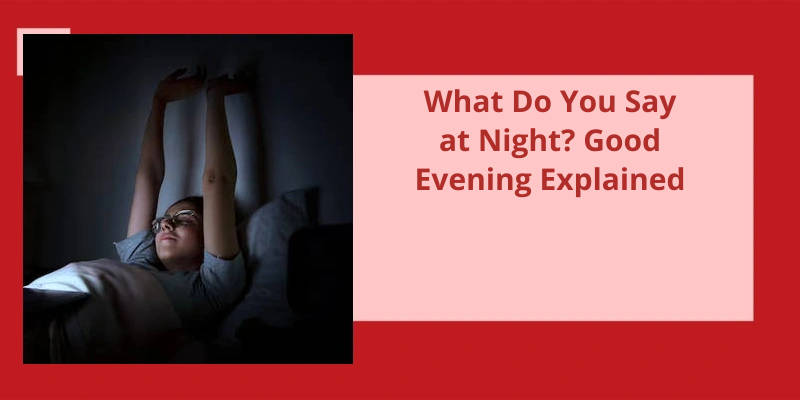What Greeting Do You Say at Night?
When it comes to greeting someone at night, the phrase “Good evening!” is often the most commonly used. This simple yet cordial greeting sets the tone for a pleasant interaction during the nighttime hours. However, it’s essential to consider the context before deciding on the proper greeting. If you’re meeting someone after sunset for a casual get-together, “Good evening!” is appropriate. It conveys warmth, politeness, and acknowledges the transition into nighttime. This greeting can be used in various scenarios, whether you’re meeting a friend for dinner, attending a social gathering, or simply passing by someone on the street.
For instance, if you’re meeting a colleague or a superior at night, using a more formal greeting might be appropriate. Phrases such as “Good evening, Mr./Mrs./Ms. [Last Name]” or “Good evening, Sir/Madam” can show respect and maintain a professional tone.
In a more intimate setting or when greeting a loved one or close friend, you might opt for a more personal and affectionate approach. Saying something like “Hey there, how was your day?” or “Good evening, my dear” allows for a deeper connection and demonstrates the care and consideration you’ve for the person. These greetings reflect a sense of familiarity and comfort in the nighttime atmosphere, making them suitable for closer relationships.
It’s always tricky to navigate the appropriate greetings throughout the day. While saying “good evening” at 11 PM might seem acceptable, it’s typically used until one is parting ways before midnight. However, it’s worth noting that the boundaries of greetings like “good afternoon” and “good evening” can overlap during the early evening hours, usually an hour or two before sunset. In contrast, “good morning” is generally used after sunrise.
Can I Say Good Evening at 11pm?
It’s commonly accepted to say “good evening” until one is parting company before midnight, regardless of the specific time. The phrase carries a connotation of bidding farewell for the day, often used when people are preparing to retire for the night. However, it’s important to note that the usage of “good evening” can vary depending on cultural norms and the context of the situation.
Similarly, the times during which “good afternoon” and “good evening” overlap typically occur an hour or two before sunset. This is when the suns position in the sky begins to transition from the afternoon to the evening. The exact timing may differ depending on geographical location and cultural practices, but it’s generally safe to say that the transition happens during the late afternoon to early evening hours.
On the other hand, “good morning” is generally used after sunrise, marking the beginning of the day. It’s a greeting commonly exchanged during the early hours of the day, before noon. The specific time frame for saying “good morning” may vary slightly, but it’s typically used to acknowledge the start of the day and express well wishes for the hours to come.
Transition Times Between Greetings: Discuss the Specific Times During the Day When Greetings Like “Good Morning,” “Good Afternoon,” and “Good Evening” Overlap or Transition Into One Another.
Transition times between greetings such as “good morning,” “good afternoon,” and “good evening” occur during specific periods of the day. These greetings overlap or transition into one another based on time and cultural conventions.
Conclusion
In the quiet solitude of the night, when the darkness envelops us and our thoughts drift into introspection, the phrase "Good evening" seems oddly fitting, despite the late hour. Perhaps it’s because "Good night" holds a connotation of parting ways, signaling the end of shared moments and the beginning of solitary journeys. Yet, in those moments past 1am, when time loses it’s grip on conventional labels, we find ourselves uttering "Good morning!" as if to embrace the new dawn that awaits us beyond the veil of night. Language, in it’s intricate dance with time, unveils the complexity of our human experience, allowing us to express emotions, transitions, and connections. So, in the ethereal realm of moonlit conversations and peaceful slumber, what we say at night bears a deeper meaning, transcending mere greetings or farewells, and becoming a reflection of our innermost selves.






